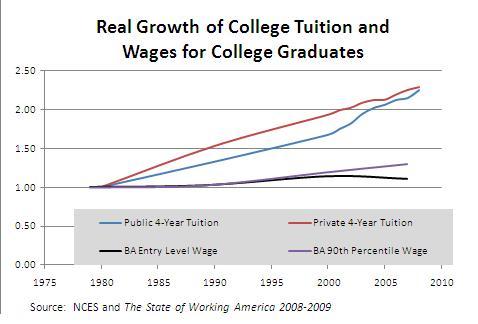The College Cost Paradox: A Bubble and The Best Investment
Three years ago, amidst the housing bubble's implosion, I asked whether college tuition increases, fueled by student and home equity debt, would be the next 'bubble' to burst. In the interim, tuition has still increased on schedule and Cornell's President Skorton has all but admitted that academe is in an unsustainable bubble. Meanwhile, there's also the ever important institutional debt bubble as well.
Today, there's increasing chatter in the blogosphere as to whether or not higher education is in a bubble, spurred on by recent comments by PayPal founder, Peter Thiel, who wisely cashed out of the dot-com bubble in 2000 and called the housing bubble in the middle of the last decade:
The idea that attending Harvard is all about learning? Yeah. No one pays a quarter of a million dollars just to read Chaucer. The implicit promise is that you work hard to get there, and then you are set for life. It can lead to an unhealthy sense of entitlement. ďItís what youíve been told all your life, and itís how schools rationalize a quarter of a million dollars in debt,Ē Thiel says.
And uber-econo blogger Matt Yglesias has chimed in, explaining (Cornell professor) Ron Ehrenbrg's argument that tuition increases occur because universities want to be the best at everything and that declining real public aid can't explain all of the cost increases in academia we have seen.
But the proof of the bubble is in the pudding. Has the price of an asset (college education tuition) grown faster than its value (the wages that a college education provides)?
Here's data from the National Center for Education Statistics and 2009's The State of Working America:

A couple of clarifications on the data: Not every student is paying the full cost of tuition, obviously, but most are, either in cash or via student loans. And while private universities tend to discount through need-based or merit-based aid, most public universities charge nearly all students full boat. The wage lines show that for both recent graduates as well as for top earners (90th percentile), their earnings power has not risen in line with the cost of college education.
At the same time, the large wage premium enjoyed by college graduates makes college education a default decision for most American families, and in many ways, college is still the best investment a human can make in their earning potential and quality of life.
Now, there's more than just private wage benefits to college education -- it can improve health outcomes, aid democratic decision-making, reduce public safety costs, and strengthen a country's cultural assets. But it's not clear to me that these benefits are any greater today than in the past. And even so, that investment should probably be born by public tax money, not private debt. Once we take in all of the positive externalities to a college education, it's not clear to me that we should be discouraging good students from going to college, which is one impact of increasing tuition.
So perhaps the real problem is that we're talking about a 'college bubble' in terms of tuition and wage benefits, and not whether or not we think too many students are going on to college or that too many individuals are working in the sector of education and research? In the case of housing, I think it was pretty clear that the U.S. was building more housing stock than necessary; but I'm not certain if we are producing more college graduates than is necessary -- otherwise the wage of college graduates would be going down over time, not up.
The broader, more interesting, dynamic is that as our modern economies become more technologically efficient in certain industries, the intensive labor costs of having an individual teach in front of a classroom can become relatively much more expensive than, say, growing better food or making warmer clothes. Ironically, in many ways it was academics who made their job so relatively expensive in the first place, by inventing/teaching the labor-saving technology which we now enjoy.
One of the challenges of the 21st century will be to make certain our market-driven economies allow us to still be able to 'afford' education and research. And somewhere on a college campus, a student or researcher is going to figure out the solution to that challenge. And it's completely possible that market mechanisms are not the best way to address this problem.



